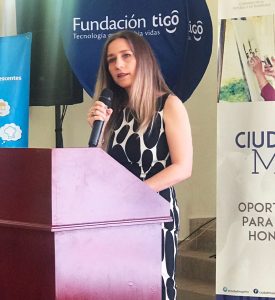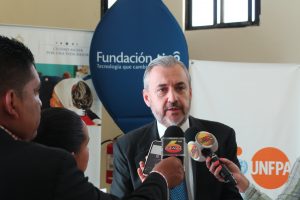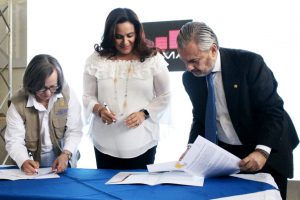In Latin America and the Caribbean, 149 million women do not own a handset: on average, women are 5 per cent less likely than men to own a mobile phone. This represents nine million fewer connected women  than men in the region, with an even greater gap emerging in rural areas. To tackle this gender gap in mobile service usage, mobile operators around the world are joining the GSMA Connected Women initiative, which was launched in February 2016 and has already received more than 42 commitments from 86 operators in 45 countries, reaching more than 17 million women.
than men in the region, with an even greater gap emerging in rural areas. To tackle this gender gap in mobile service usage, mobile operators around the world are joining the GSMA Connected Women initiative, which was launched in February 2016 and has already received more than 42 commitments from 86 operators in 45 countries, reaching more than 17 million women.
“Women are essential for achieving the Sustainable Development Goals, and technology will help them access capacity building, education and the tools they need to move ahead. We’re seeing how our Connected Women initiative is spreading across Latin America, seeking to empower women through technology,” said Paula Ferrari, Marketing Director, GSMA Latin America.
 Supporting SDG 5 – Gender Equality Tigo Honduras has joined the GSMA Connected Women initiative, which aims to reduce the gender gap in mobile internet and mobile money services. “Tigo Honduras pledges to increase the proportion of women in its customer base for the Tigo Money electronic wallet from 48.7 per cent to 50 per cent by 2020,” announced Santiago Benedit,Tigo Honduras CEO.
Supporting SDG 5 – Gender Equality Tigo Honduras has joined the GSMA Connected Women initiative, which aims to reduce the gender gap in mobile internet and mobile money services. “Tigo Honduras pledges to increase the proportion of women in its customer base for the Tigo Money electronic wallet from 48.7 per cent to 50 per cent by 2020,” announced Santiago Benedit,Tigo Honduras CEO.
Tigo Honduras has joined Millicom operations in Paraguay, El Salvador and Guatemala that are working towards closing the mobile gender gap in the region. With Paraguay’s First Lady, Ana de Hernández as witness of honour, Tigo Honduras signed a cooperation agreement with the Ciudad Mujer project, donating 25 tablets as a technology contribution to be used in the Adolescents Module, which will set up digital and interactive programmes for sexual health and prevention. The goal of Ciudad Mujer is to help improve the living conditions of women in Honduras in terms of financial independence, response to violence against women, reproductive and sexual health, collective education and similar areas through a network of services provided by public institutions at a one-stop centre.
“We know that women are largely missing out on digital and financial inclusion. We want to change this by empowering women so they can be part of the mobile ecosystem and use mobile data and mobile financial services that will enhance their socioeconomic development,” said Rachel Samren, Executive Vice President and Chief External Affairs Officer, Millicom.
 Underscoring the mobile industry commitment to the United Nations Sustainable Development Goals, the GSMA We Care campaign is an initiative of the region’s leading mobile operators to ensure all their users can enjoy the life-changing benefits of mobile technology in a safe and secure environment. To achieve this, operators have decided to join forces as an industry and take on a series of commitments in every country in the region where mobile phones and networks can provide solutions to social problems. The initiative has been launched in Argentina, Bolivia, Brazil, Chile Colombia, Costa Rica, Ecuador, El Salvador, Guatemala, Honduras, Mexico, Nicaragua Peru and the Dominican Republic, and will continue to expand across the region.
Underscoring the mobile industry commitment to the United Nations Sustainable Development Goals, the GSMA We Care campaign is an initiative of the region’s leading mobile operators to ensure all their users can enjoy the life-changing benefits of mobile technology in a safe and secure environment. To achieve this, operators have decided to join forces as an industry and take on a series of commitments in every country in the region where mobile phones and networks can provide solutions to social problems. The initiative has been launched in Argentina, Bolivia, Brazil, Chile Colombia, Costa Rica, Ecuador, El Salvador, Guatemala, Honduras, Mexico, Nicaragua Peru and the Dominican Republic, and will continue to expand across the region.
In Honduras, the We Care campaign was launched at the beginning of 2016, when Claro, Hondutel and Tigo signed a cooperation agreement with the GSMA and Conatel to fight handset theft, promote digital inclusion in schools and support the Honduran Red Cross.
Resources
- Image gallery
- Presentation Paula Ferrari
- More about Connected Women
- More about “We Care“
- More about Sustainable Development Goals
- Download the Sustainable Development Goals App